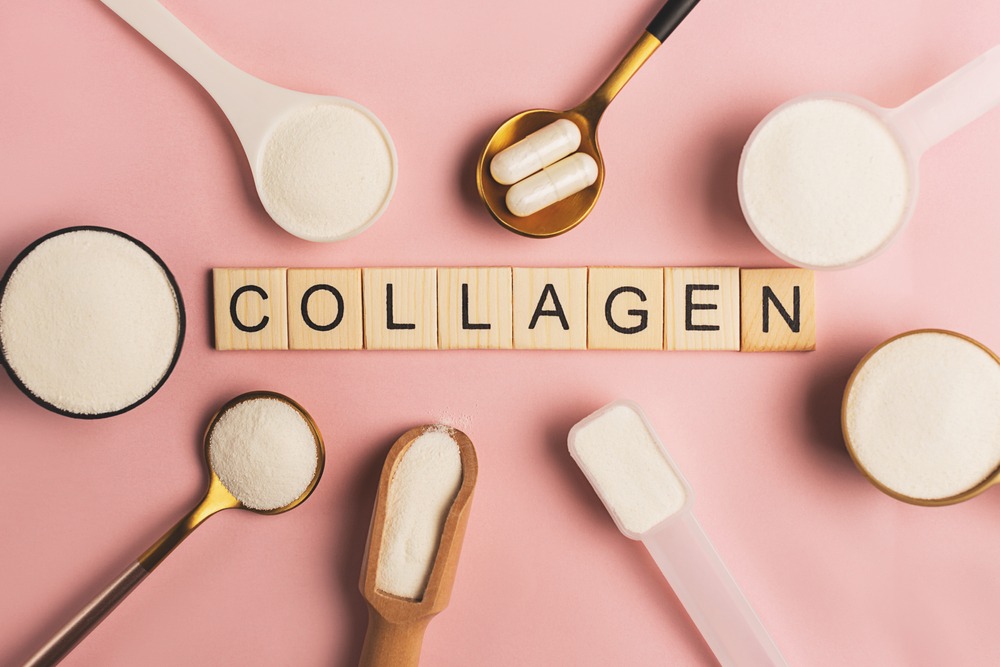Collagen supplements, creams, and other products have become very popular in recent years, leading many athletes to wonder if they can use these products. The use of any supplement comes with some level of risk, but here are some other key things athletes should know about collagen and collagen products.
What is collagen, and what does it do?
 Collagen is an abundant protein making up 30 percent of all protein in the body. Collagen makes up the structure of tendons, ligaments, cartilage, muscles, blood vessels, organs, hair, skin, nails, the intestinal lining, and more.
Collagen is an abundant protein making up 30 percent of all protein in the body. Collagen makes up the structure of tendons, ligaments, cartilage, muscles, blood vessels, organs, hair, skin, nails, the intestinal lining, and more.
The body naturally produces collagen from the amino acids proline, hydroxyproline, and glycine. In order for your body to properly manufacture collagen, vitamin C is also required. The chemical synthesis of collagen inside the body is energy intensive, and the presence of vitamin C makes the necessary chemical reactions possible.
Since collagen forms a big part of cartilage in joints, athletes often want to improve their joint health and function by trying to maintain or increase their collagen levels. Unfortunately, there are no medical tests that can tell you whether you have high or low collagen levels, but there are things that you can do to protect collagen and maintain healthy collagen levels through nutrition.
What is a food-first approach to supporting natural collagen production?
If you want to increase the level of amino acids needed for collagen production, there are many foods that supply the starting materials for collagen production. One way to get the required amino acids would be to eat collagen-rich foods, such as bone broth, chicken with the skin still on, or meats slow-cooked with the bone in.
If that does not sound appetizing, all the necessary nutrients and amino acids can be found in the foods below:
- Vitamin C can be found in citrus fruits, bell peppers, and potatoes.
- Copper is found in lobster, oysters, shiitake mushrooms, nuts, leafy greens, tofu, and dark chocolate.
- Zinc is found in oysters, red meat, poultry and pork, beans, chickpeas, nuts, leafy greens, and whole grains.
- Proline is found in egg whites, soy protein, cabbage, asparagus, mushrooms, and sunflower seeds.
- Glycine is found in peas, lentils, kidney beans, tofu, cabbage, asparagus, fish, dairy products, and meat.
Is collagen prohibited?
No, the substance collagen is not prohibited by the World Anti-Doping Agency (WADA). Since collagen is made from amino acids, it is sometimes referred to as “collagen peptides” but these are not the same thing as “peptide hormones” on the WADA Prohibited List. Peptide hormones (e.g., growth hormone releasing peptides) are prohibited in sport, but collagen peptides are not prohibited.
Do collagen supplements work?
Eating collagen protein, either through collagen-rich foods or dietary supplements, will not directly result in an increase in collagen in the body. Collagen is an incomplete protein that, once taken, will be completely dissolved in the gastrointestinal system into its component parts. The final destiny of those component parts may be new collagen, but there’s a good chance they will be used for other things as well.
While eating collagen or rubbing it on your skin in a cream will not automatically shuffle more collagen peptides directly to areas of cartilage damage, having enough protein in your diet, along with vitamin C, copper, and zinc, provides all the starting materials for collagen production.
Do collagen creams work?
Applying collagen cream to your skin will not result in the direct incorporation of that collagen into the structure of your skin. The skin is an excellent barrier, and the collagen in any cream applied to the skin will remain on the surface of the skin. However, wearing sunscreen can help prevent the sun’s damaging ultraviolet rays from breaking down the collagen in your skin.
Are there medical uses for collagen?
Yes. Collagen is widely used as a biomaterial in wound healing applications, such as dressing for burns, and sutures. Collagen used for medical purposes can be obtained from donors, or grown in a lab.
Can I get a Therapeutic Use Exemption (TUE) for collagen?
No, because it is not prohibited, and a TUE is therefore unnecessary.
How can I get my collagen supplement approved by USADA?
USADA does not have an evaluation or approval process for dietary supplements. Please read USADA’s recommendation on reducing your risk from dietary supplements. Regardless of the type of supplement product, athletes should be aware of the risks and perform a thorough evaluation of every supplement product for prohibited substances.
More questions?
For questions about specific products, substances, and methods, contact USADA’s Drug Reference Line at drugreference@USADA.org or call (719) 785-2000, option 2.
More education?
In addition to educating athletes and offering real-time support, USADA offers resources and tutorials for athlete support personnel, including health professionals and coaches.
Read more Spirit of Sport blog posts



